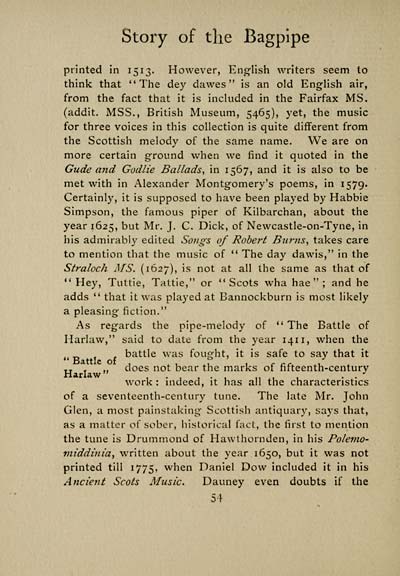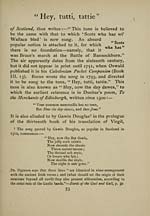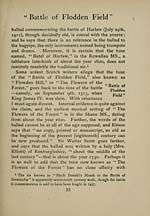Inglis Collection of printed music > Printed text > Story of the bagpipe
(80) Page 54
Download files
Complete book:
Individual page:
Thumbnail gallery: Grid view | List view

Story of the Bagpipe
printed in 15 13. However, English writers seem to
think that "The dey dawes " is an old English air,
from the fact that it is included in the Fairfax MS.
(addit. MSS., British Museum, 5465), yet, the music
for three voices in this collection is quite different from
the Scottish melody of the same name. We are on
more certain ground when we find it quoted in the
Gude and Godlie Ballads, in 1567, and it is also to be
met with in Alexander Montgomery's poems, in 1579.
Certainly, it is supposed to have been played by Habbie
Simpson, the famous piper of Kilbarchan, about the
year 1625, but Mr. J. C. Dick, of Newcastle-on-Tyne, in
his admirably edited Songs of Robert Bums, takes care
to mention that the music of " The day dawis," in the
Straloch MS. (1627), is not at all the same as that of
"Hey, Tuttie, Tattie," or "Scots wha hae " ; and he
adds " that it was played at Bannockburn is most likely
a pleasing fiction."
As regards the pipe-melody of " The Battle of
Harlaw," said to date from the year 141 1, when the
,, ^ . battle was fouerht, it is safe to say that it
" Battle of , . . X » , e fiA . f /
TT , „ does not bear the marks of nfteenth-centurv
rlarlaw ,..,., ., , , . .
work : indeed, it has all the characteristics
of a seventeenth-century tune. The late Mr. John
Glen, a most painstaking Scottish antiquary, says that,
as a matter of sober, historical fact, the first to mention
the tune is Drummond of Hawthornden, in his Polenio-
middinia, written about the year 1650, but it was not
printed till 1775, when Daniel Dow included it in his
Ancient Scots Music. Dauney even doubts if the
54
printed in 15 13. However, English writers seem to
think that "The dey dawes " is an old English air,
from the fact that it is included in the Fairfax MS.
(addit. MSS., British Museum, 5465), yet, the music
for three voices in this collection is quite different from
the Scottish melody of the same name. We are on
more certain ground when we find it quoted in the
Gude and Godlie Ballads, in 1567, and it is also to be
met with in Alexander Montgomery's poems, in 1579.
Certainly, it is supposed to have been played by Habbie
Simpson, the famous piper of Kilbarchan, about the
year 1625, but Mr. J. C. Dick, of Newcastle-on-Tyne, in
his admirably edited Songs of Robert Bums, takes care
to mention that the music of " The day dawis," in the
Straloch MS. (1627), is not at all the same as that of
"Hey, Tuttie, Tattie," or "Scots wha hae " ; and he
adds " that it was played at Bannockburn is most likely
a pleasing fiction."
As regards the pipe-melody of " The Battle of
Harlaw," said to date from the year 141 1, when the
,, ^ . battle was fouerht, it is safe to say that it
" Battle of , . . X » , e fiA . f /
TT , „ does not bear the marks of nfteenth-centurv
rlarlaw ,..,., ., , , . .
work : indeed, it has all the characteristics
of a seventeenth-century tune. The late Mr. John
Glen, a most painstaking Scottish antiquary, says that,
as a matter of sober, historical fact, the first to mention
the tune is Drummond of Hawthornden, in his Polenio-
middinia, written about the year 1650, but it was not
printed till 1775, when Daniel Dow included it in his
Ancient Scots Music. Dauney even doubts if the
54
Set display mode to: Large image | Transcription
Images and transcriptions on this page, including medium image downloads, may be used under the Creative Commons Attribution 4.0 International Licence unless otherwise stated. ![]()
| Special collections of printed music > Inglis Collection of printed music > Printed text > Story of the bagpipe > (80) Page 54 |
|---|
| Permanent URL | https://digital.nls.uk/94510136 |
|---|
| Description | Scottish and English songs, military music and keyboard music of the 18th and 19th centuries. These items are from the collection of Alexander Wood Inglis of Glencorse (1854 to 1929). Also includes a few manuscripts, some treatises and other books on the subject. |
|---|
| Description | The Glen Collection and the Inglis Collection represent mainly 18th and 19th century Scottish music, including Scottish songs. The collections of Berlioz and Verdi collected by bibliographer Cecil Hopkinson contain contemporary and later editions of the works of the two composers Berlioz and Verdi. |
|---|

